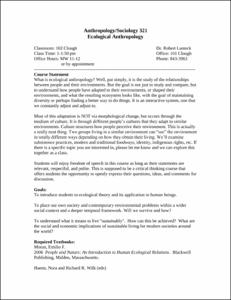Please use this identifier to cite or link to this item:
http://hdl.handle.net/10267/10604Full metadata record
| DC Field | Value | Language |
|---|---|---|
| dc.contributor.author | Lusteck, Robert K. | - |
| dc.date.accessioned | 2011-08-31T18:28:03Z | - |
| dc.date.available | 2011-08-31T18:28:03Z | - |
| dc.date.issued | 2009-08 | - |
| dc.identifier.uri | http://hdl.handle.net/10267/10604 | - |
| dc.description | This syllabus was submitted to the Rhodes College Office of Academic Affairs by the course instructor. | en_US |
| dc.description.abstract | What is ecological anthropology? Well, put simply, it is the study of the relationships between people and their environments. But the goal is not just to study and compare, but to understand how people have adapted to their environments, or shaped their environments, and what the resulting ecosystem looks like, with the goal of maintaining diversity or perhaps finding a better way to do things. It is an interactive system, one that we constantly adjust and adjust to. | en_US |
| dc.language.iso | en_US | en_US |
| dc.publisher | Memphis, Tenn. : Rhodes College | - |
| dc.relation.ispartofseries | Syllabi CRN;10111 | en_US |
| dc.rights | Rhodes College owns the rights to the archival digital images in this repository. Images are made available for educational use only and may not be used for any non-educational or commercial purpose. Approved educational uses include private research and scholarship, teaching, and student projects. For additional information please contact archives@rhodes.edu. Fees may apply. | - |
| dc.subject | Anthropology and Sociology, Department of | en_US |
| dc.subject | Syllabus | en_US |
| dc.subject | Curriculum | en_US |
| dc.subject | Academic departments | en_US |
| dc.subject | Text | en_US |
| dc.subject | 2009 Fall | en_US |
| dc.title | ANSO 271-01, Ecological Anthropology, Fall 2009 | en_US |
| dc.type | Syllabus | en_US |
| Appears in Collections: | Course Syllabi | |
Files in This Item:
| File | Description | Size | Format | |
|---|---|---|---|---|
| 2009_fall_ANSO_321.pdf | 77.65 kB | Adobe PDF |  View/Open |
Items in DSpace are protected by copyright, with all rights reserved, unless otherwise indicated.